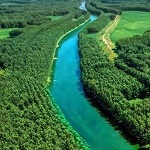2018-02-09 来源: 86Links

However, what Yuji did not know was that 812 years later, her burial site became where Emperor Yang Guang would always pass through on his journey to Yangzhou, after a canal of 1,300 miles stretching from the capital Luoyang all the way to Yangzhou was dug. Since then, the city where she was buried had become one of the core transport hubs of this canal.
Scene of Yuji's suicide in "Farewell My Concubine".
The once prosperous city where Yuji was buried is Suzhou in Anhui, China. The canal that once connected the capital of the dynasty with Yangzhou, is called the Grand Canal of Sui and Tang Dynasties. The Grand Canal that we are familiar with today was built after the construction of the Grand Canal of Sui and Tang Dynasties under the Sui Emperor Yang Guang.
Regarding Suzhou and the Grand Canal of Sui and Tang Dynasties, I have a piece of bad news and a piece of good news. The bad news is: The Grand Canal of Sui and Tang Dynasties, after running and serving the cities along its route for nearly 600 years, was eventually destroyed by the government. Today, the Grand Canal of Sui and Tang Dynasties has long disappeared in the land of China, and has turned into cities, villages, and farmlands.
Map of the Grand Canal of Sui and Tang Dynasties
While applying for the UNESCO World Heritage status, which lasted eight years, a great number of valuable cultural relics were unearthed in the cities along the Grand Canal of the Sui and Tang Dynasties. Especially in the Suzhou section, when you step into the Suzhou Museum, you will see plenty of porcelain bowls, bronze mirrors, copper coins, porcelain sculptures, and porcelain toys from more than 1000 years ago.
However, there is more I would like you to see than just the relics of the Grand Canal of Sui and Tang Dynasties preserved in the museum. Therefore, the good news is that not all of the 1,300 miles of the Grand Canal were dried up in the land of China. There is still 5.8 kilometers of it flowing in Suzhou, which has maintained the most primitive scenery of the ancient canal.
The remaining site of the Grand Canal
The scenery of these 5.8 kilometers of the ancient canal is probably just like the "paradise" that we as Chinese people would often refer to. Walking along this ancient canal that has been flowing for more than 1,400 years, you will see in the south a vast green farmland, and in the north a simple and ordinary small village. On both sides of the ancient canal, are rows of fresh willow, peach and pagoda trees.
Now, you may want to take a boat ride and enjoy the beautiful scenery along this thousand-year-old canal. On this boat ride, you are told that very soon, this ancient canal is no longer open for traffic, and can only be used for irrigation on the farmland on the shore and for flood discharge. See the water pipe in front of the river and the farmland? That is the pipe used to irrigate the farmland with the canal water.
Villagers on the Canal
After the friendly reminder from the villagers, you smile and say, "Understood. Thank you." Then, you quietly observe the villagers here. Look at the children playing in the village; the middle-aged hardworking farmers planting crops and fishing; and the elderly keeping an eye on the naughty children ...
It has been this way for two thousand years. The villagers in China have lived this way for two thousand years, working from sunrise and resting at sunset.
Morning fog on the canal.
As you are watching, you, who have been living in Beijing, Shanghai or Singapore for a long time, get lost along the ancient canal. You are lost in the most primitive scenery of the ancient canal in front of you; you are lost in this thousand-year-old cultural heritage epitomized in the flowing canal; you are lost between the choice of the ancient pure nature and the modern fast-paced life.
I suppose, if Xiang Yu, the conqueror of Western Chu was given a second chance, he might have preferred to retreat to the canal with Yuji and live in seclusion, with him ploughing, and her weaving, sowing seeds in the spring and harvesting in the autumn. And Emperor Yang Guang, who died along with the end of his empire, at the moment of his defeat, might have wanted to bring his own queen to this canal that he himself built, and live a quiet life thereafter.
However, time cannot be reversed, and history cannot be assumed. The ancient canal in front of us tells us that we should not go so far to the point that we forget why we embarked on this journey.
Chinese:
大家好~我想从中国绝世美人虞姬的故事,开始今天的分享。2220年前,虞姬因丈夫项羽兵败而自尽的故事,成就了今天中国电影的巅峰作品之一《霸王别姬》。
只是,虞姬不知道的是:埋葬她的那片土地会在812年后,成为了亡国皇帝杨广去往扬州的必经之地。因为杨广从都城洛阳开凿了1300里的运河,直达扬州。而虞姬的葬身之地就是这条运河的核心交通枢纽之一。
这个曾经安葬虞姬、繁华一时的城市便是中国安徽的宿州。这条曾经连接王朝首都与扬州的千里运河叫隋唐大运河。我们熟悉的京杭大运河就是在,隋朝皇帝杨广是修筑隋唐大运河之后开凿的。
关于宿州和隋唐大运河,我这里有一个坏消息和一个好消息。坏消息是:隋唐大运河在流淌了近600年、为沿河城市服务了600年后,被政府进行人为的毁坏。直至今天,隋唐大运河早已消失在中国大地。曾经的运河水化成了城市、村庄和农田。
在中国大运河申遗的八年期间,隋唐运河古迹沿线城市,出土了大量珍贵的运河文物。尤其是宿州段,走进宿州博物馆,你就能看到很多1000多年前,隋唐大运河遗留下的瓷碗、铜镜、铜钱、瓷塑、瓷玩具等。
但,我不希望只让你看保存在博物馆里的隋唐大运河。所以,我给你带来的好消息是:这1300里的隋唐运河并没有全部干涸在中国大地,仍有5.8公里的隋唐大运河在宿州流动,保持着古运河最原始的风貌。
这5.8公里的古运河风光,就像我们中国人口中常说的“世外桃源”吧。走在这流淌了1400多年的古运河边上,向南望去,是一片一望无际的绿色农田;向北细看,是平凡朴素的小村庄。古运河两岸边是一排排清新阳光的柳树、桃树和槐树。
看到这里,也许你会想乘着一只小船,在这千年运河水上游览两岸风光。但很快你会被告知:古运河不能通航了,只能用来灌溉岸上的农田和排泄洪水。你看到前面那只通联河水和田地的水管了吗?那就是用来把运河水灌溉农田的水管。
面村民的友善提醒,你浅浅一笑道:明白啦,谢谢。然后,你会悄悄地观察这里的村民,看着村里小孩子们嬉戏玩闹;看着中年人们辛勤耕种捕鱼,踏实做事;看着老人们看管着顽皮的孩子…
就这样,两千年了,中国的农村人已这样生活了两千年了。他们日出工作、日落休息。
看着看着,长久生活在北京、上海或者新加坡的你们,还是在古运河边迷路了。你迷路在眼前最原始的古运河风光里;你迷路在这悠悠运河水凝聚的千年文化遗迹里;你迷路在古代的清新自然和现代快节奏生活的选择里。
我想,如果给西楚霸王项羽重来一次的机会,他可能更愿意和虞姬归隐到这运河边,男耕女织、春种秋收吧。还有那身死国灭的杨广,他在兵败的那一刻,也许更愿意带着自己的皇后来到这个自己修筑的运河边,默默生活。
然而时光不能穿越,历史不能假设。只是眼前的一湾古运河水告诉我们:我们不能因为走得太远,而忘记了当初为什么而出发。